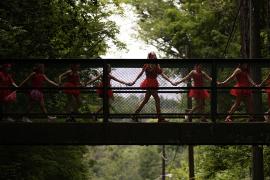An Interview with Joseph Cornell
From a young age, author Joseph Cornell felt the awe and wonder of nature. For nearly forty years, Cornell has shared his passion for nature with the world, notably in the widely read and translated Sharing Nature with Children. His book inspired two more volumes of Sharing Nature activities: Sharing Nature with Children, Volume II and Listening to Nature, Volume III, and was recently updated for its twentieth anniversary. In an interview with ACA, Cornell spoke about the importance of nature in the camp experience and how nature helps create a sense of community at camp.
How does nature create a sense of community at camp?
We often think of camp as a social experience for campers: making new friends and meeting new people from different backgrounds and lifestyles. When we go out into a forest, though, we're also entering a very ancient community — one that is filled with life that has been cooperating with each other for thousands of years.
There's a reason why most camps are out in nature. Every religious tradition talks about how there's no "ego" in nature. There's a healing quality when we go out in to the forest. At camp, we take that into our lives, and we can relax and experience a feeling of serenity. I know camps can be lively places, but they should also be places where campers connect with each other in that serenity. It's a wonderful place to help people open up and go beyond themselves and discover new ways of being. It's important to include nature as part of the camp experience because it's honoring why camps are located in beautiful natural settings.
There is a story of a biologist in Eastern Siberia in the nineteenth century who was studying the wildlife in the region. He thought that the animals that survived the best would be the strongest. During this time, "the survival of the fittest" theory of evolution was just becoming accepted by biologists. But the biologist found the animals who did the best in the harsh environment of Siberia were the ones that cooperated with the other species.
At this time in our history it is imperative that people understand that we are a part of a much greater community than just our own species. We need to help children open up to the world around them and start to understand this. We need to foster in young people feelings of strong connection and love for the world.
The playful and fun nature of the activities in my Sharing Nature books helps children relax and bond with each other and build a sense of community among themselves. When children are relaxed, they feel safe with each other and feel comfortable sharing their innermost thoughts and reflective experiences in nature — which is critical to learning. You're achieving two ends: You're helping your campers grow closer to each other, and you're also helping them grow closer to the natural world.
So, why is camp such an effective place for children and youth to appreciate nature?
Campers are out of their normal routine, and in the new setting, it's easier to embrace new concepts, new ways of being, and experience the beautiful surroundings. I was working with the Children's Nature Institute in Los Angeles — an organization that takes inner-city children to natural areas such as parks along the coast. Many of the children they work with have never been outside of their neighborhoods before. They told me that about one in seven children become completely mesmerized by their first experience in a wild place. They told of one child who became perfectly still and seemed to take in the whole field of flowers and the hills overlooking the Pacific Ocean.
Modern children have a high level of energy and camp life needs to be very busy to keep them engaged. But it is important to create within the camp experience time to slow down and appreciate the natural surroundings. I have a friend who went to wilderness camp as a child. She did a lot of adventure activities: kayaking, climbing, rope skills, zip lining. She also had twenty minutes a day to spend in the forest by herself, and that was her favorite activity during the whole week. It's interesting to note that in many societies — past and present — young people are asked to spend time alone in nature and reflect on their relationship with the rest of life. They are away from their peers and can get in touch with themselves and how they really feel about things.
Teenagers are so social that they can become easily caught-up in what their friends think, the clothes they wear, and the music they listen to. It's very healing for young people to step away from all that and be quiet in themselves and ask themselves: "What do I believe? What do I feel about the life around me? What is my relationship to everything?" In that clear space, they can come back to themselves.
How can camps capitalize on natural surroundings to build life skills in campers?
Nature can bring out our finer human qualities. The founders of the American nature study movement in the early 1900s said that sensitivity to life was the highest product of education. The Sharing Nature activities help children and youth develop valuable qualities such as compassion, calmness, and curiosity.
To encourage the sense of empathy in others, we must begin with awareness. You first have to become cognizant that there is life around you! Sensory activities help campers richly experience the world through touching, seeing, hearing, and perhaps smelling. The reason blind walks are so effective is that participants have to rely heavily on their senses so their minds stop thinking and they focus on what is around them.
Psychologists have said people have about 300 "self-talk" thoughts a minute. Usually those thoughts are about oneself. How can you be aware of what's around you if you have this internal dialogue going on all the time? Sensory activities help stop this whole thinking and self-preoccupation process. In that moment of free space, you start to notice the world outside of you. By being aware, we naturally become interested in everything around us.
Creating a sense of serenity and finding one's own center can be fostered through nature activities. There's an activity called "I Can See," where the group leader sits behind a small group of older children (twelve years old or older) and simply says, "I can see." The child on the left says out loud what he or she notices: "The clouds drifting in the sky." Then the leader would say, "I can hear." And the second child would listen and say, "The leaves rustling in the wind," and so on. This helps children enter into and remain in the present moment.
The activity called "Silent Sharing Walk" is usually played in the evening hours and it helps campers feel a deep bond with the world around them. In this activity, you take ten or so campers on a trail together. You don't talk to each other; you just enjoy the rhythms of the natural world around you. Participants can tap each other on the shoulder and point out interesting things to observe, but the sharing is done in silence. The animals are relaxed because everyone is so quiet, and a beautiful interplay happens between people and the natural world. In this harmonious atmosphere, we've had many people comment on how they've overcome their fear of bats, for example, or other animals because they were feeling so connected to everything in that serene atmosphere. Through sensitive, reflective nature activities, people learn about nature, but also about their finer human qualities as well. By holding group discussion afterwards, you can bring this newfound awareness to the surface.
How can camps make learning about nature fun and meaningful?
Having the right activities really helps. Children like to be active and use their bodies — and if they are having fun, they are more apt to like the subject. Children and young people are very energetic, and you often have to meet them on a high level of energy. Then you can use activities to help transition to a calmer state of receptive awareness and introspection. I have developed an outdoor teaching strategy that does this well; it's called Flow Learning™.
What is Flow Learning and how can it be incorporated into learning about nature?
Flow Learning helps you work with people where they are and then gradually bring them step-by-step to more profound experiences of nature. It has four stages. These stages allow you to create a strong sense of momentum in your nature classes. Adult leaders sometime think you cannot do reflective activities with children. But with the right activity and with the right introduction, you can — especially if the timing is right. This is where Flow Learning comes in.
Stage One: Awaken Enthusiasm
The first step is to awaken enthusiasm. In this stage, high energy activities that engage people's whole-hearted participation are played. The more one puts himself into something, the more he gets out of it. Awaken Enthusiasm nature activities make learning fun, experiential, and dynamic.
Stage Two: Focus Attention
We don't want to leave the study of nature on a level of fun and games. The second stage of Flow Learning is Focus Attention. These activities challenge campers to achieve a fun task that requires them to become more observant and attentive to nature.
Stage Three: Direct Experience
The third stage of Flow Learning is Direct Experience. During this stage you introduce activities that give campers an absorbing experience of some aspect of nature. Direct Experience activities bring campers face-to-face with nature in a memorable way.
Stage Four: Share Inspiration
Research has shown that it's not enough to just have an experience; children and adults need to reflect on that experience to gain clarity and understanding of its importance. The fourth stage of Flow Learning is Share Inspiration. In this stage, participants share their experiences and inspirations with others in creative ways.
Flow Learning is a beautiful way of working with people. You aren't trying to push or drive them. You're offering people experiences that they readily respond to so they are powered by their own enthusiasm. As they become more open, they're ready for the next experience. It is like climbing the rungs of a ladder — you're introducing engaging experiences that help children climb toward greater reflection and sensitivity to nature.
It's much more rewarding for the leader to share things in a way that is meaningful to campers rather than force feed them! Flow Learning takes away many discipline problems because everyone is having so much fun. Flow Learning also helps you work with the energy level of the group. If the group is tired, you can pick their spirits up with the Awaken Enthusiasm activity. Or if they are too excited, you can calm them down with the rest of the stages so that they are much more engaged with the overall experience you are trying to create.
Originally published in the 2011 September/October Camping Magazine.


